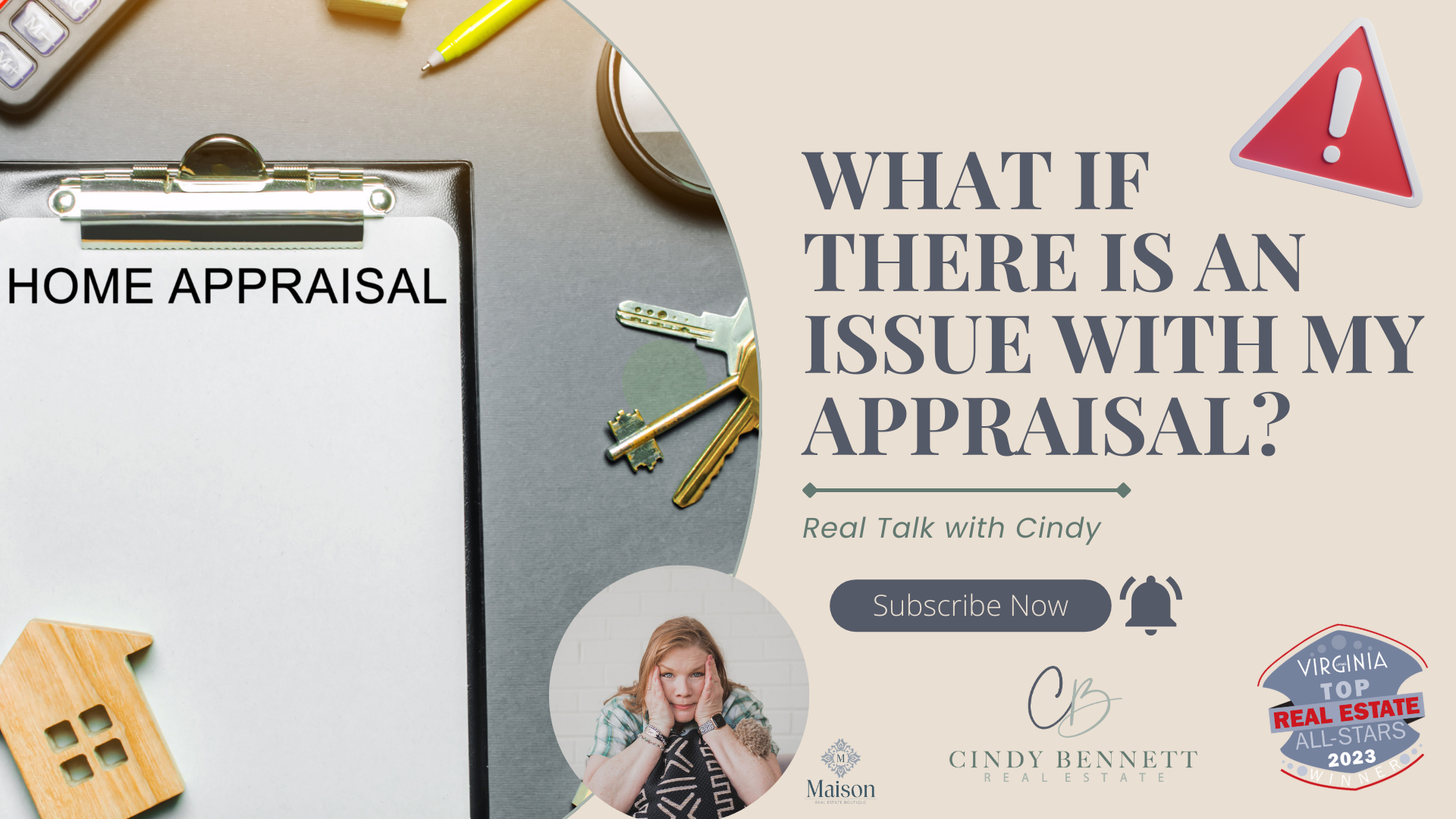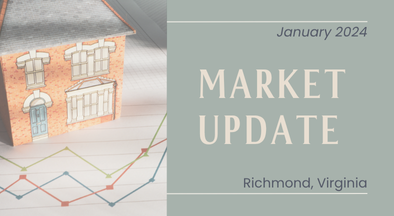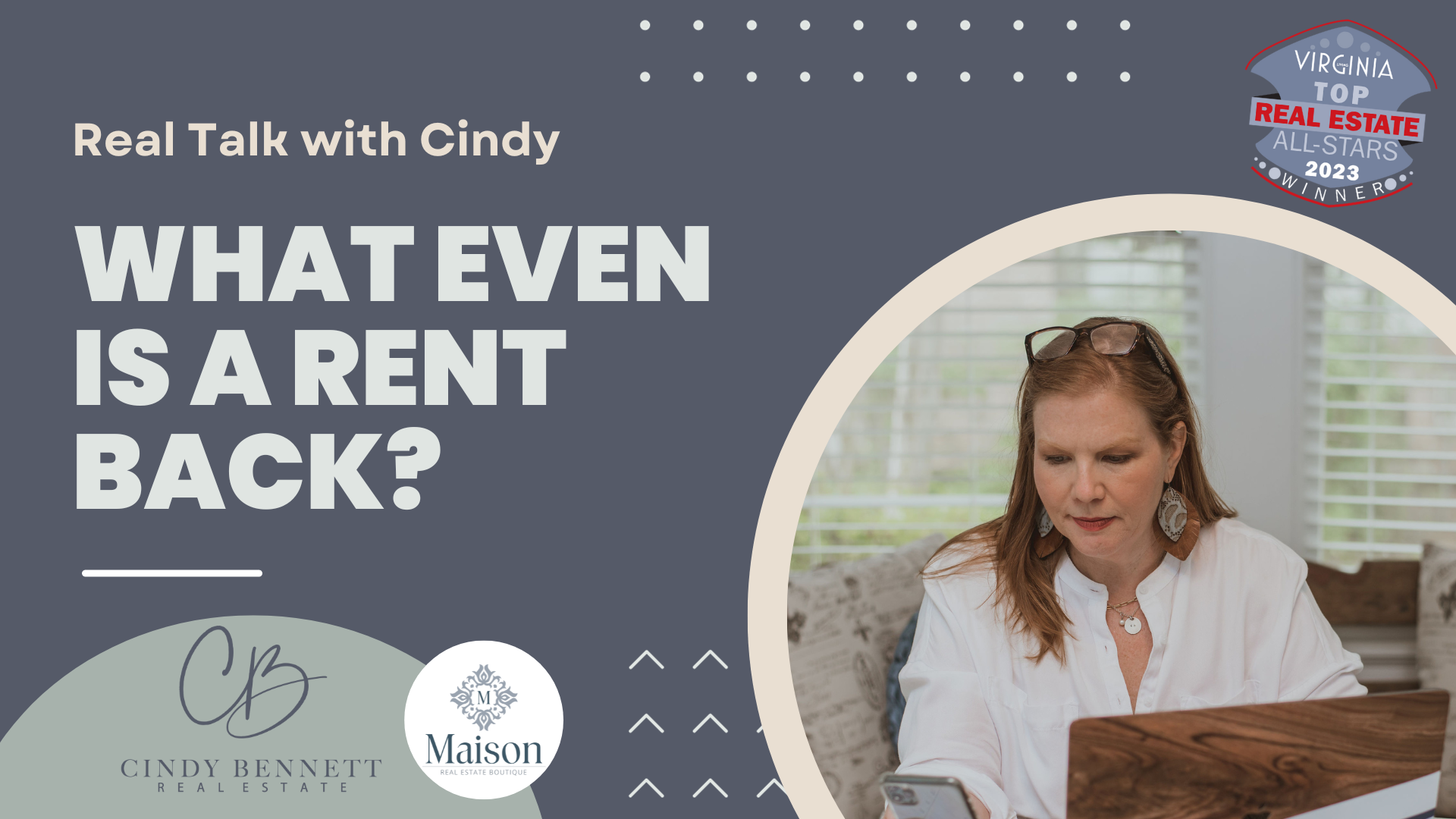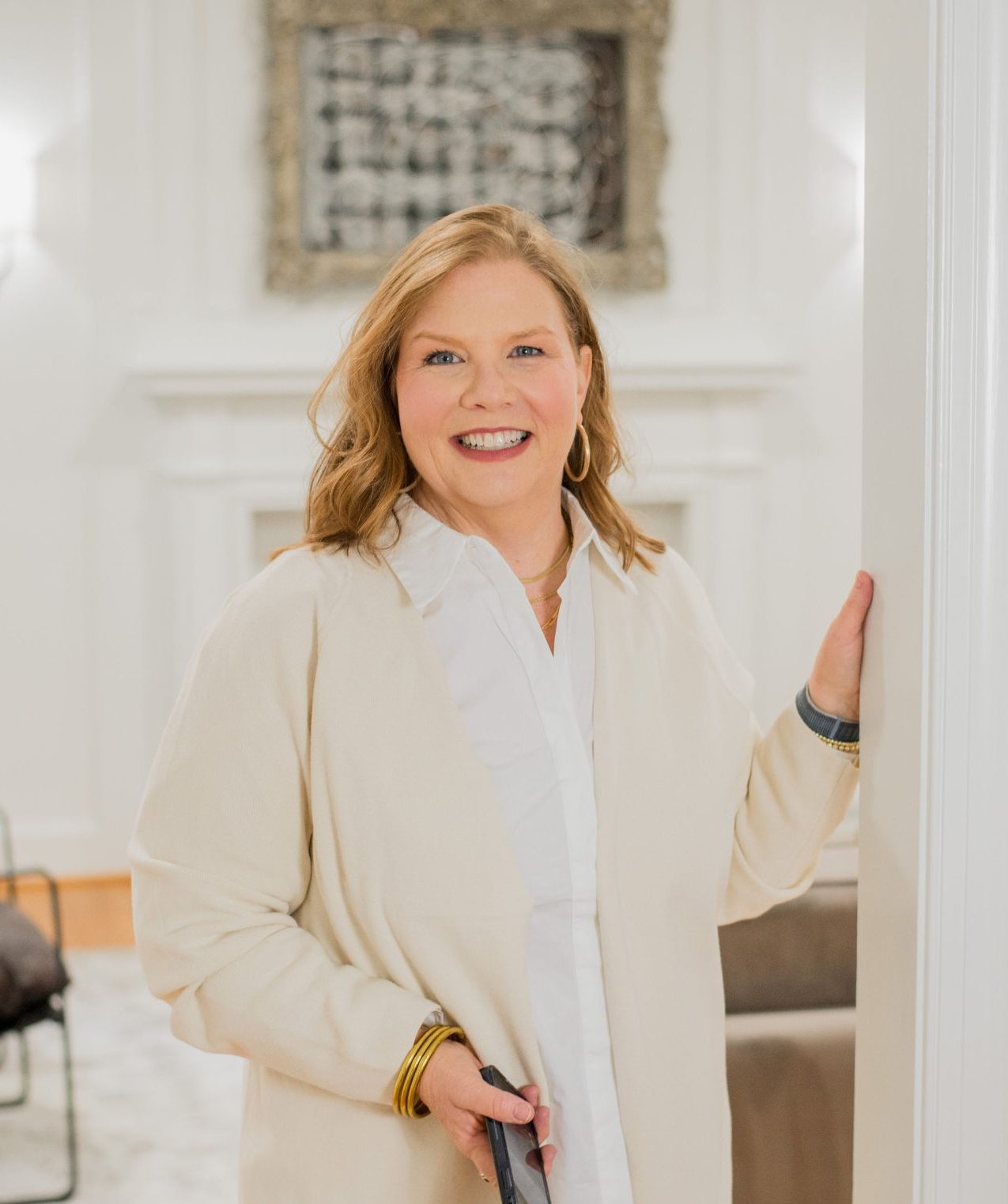Real Estate
Keep on top with latest and exclusive updates from our blog on the Los Angeles real estate world. Cindy Bennett Real Estate posts about tips and trends for buyers, sellers, and investors every week. Whether it be about staging your property or a snapshot of the market, this is your one stop shop.

So what do you do if there is an issue with the appraisal? Let's give an example. You purchase a house for $450,000 and the appraisal comes back and it's $425k. Now, what do you do? Well, in our contract, and again, this is the Central Virginia contract. So I'm in the Richmond area, surrounding counties, we have our own particular contract, the contract where you are may be different. In our contract, it states that within five days of receiving that appraisal, the purchaser has the right to request in writing, whatever sort of resolution they would like from the seller and that can be a number of different things. First off, they can request that the price be reduced. So if the house is $450,000, that's what the contract price is, the appraisal comes in for $425k. Maybe you're the purchaser and you don't have an extra $25,000. You may have to go to the seller in writing and say, 'Can you please reduce the price to $425k'. Now they can say yes, or they can say no, or they can present a different option. But if you cannot come to a resolution, then all parties can walk away. No harm, no foul. Another resolution might be that, say you were in a competitive situation when you wrote the offer and you wrote the offer for $450k. There were a number of other offers, you do have the cash to back it up, and you say, oh rats the home appraisal came in at $425k, but we really want the house. We feel like it's worth $450k. It's worth 450 to us and we're willing to throw an extra $25,000 in there to bridge that gap. Obviously, you need to have 25,000 extra dollars. Or in some cases, you can kind of maneuver your loan a little bit to come up with a little extra cash, but that's between you and your lender. So the buyer can actually pay the cash difference, the lender doesn't care. What the lender cares about is if they're giving you 80% of the value, they're only going to give you 80% of the value that the appraiser says it's worth, period, end of story. They're not going to give you any extra because you really liked the house because it was a competitive situation. They don't care because it's the bottom line number for the lender and that is ultimately who the appraiser works for.
Read more
So I've seen a couple of things in the past day on social media talking about getting your pre-approval letter, getting pre-qualified with a lender, and getting ready to buy a home. So I wanted to clarify a couple of things. One thing that I saw was in The Wall Street Journal, and it said that you as a buyer, get a real leg up if you have your pre-qualification or your pre-approval ready to go. Here in the Central Virginia, Richmond metro area, sure, we'll call it a leg up. I'm actually not going to call it a leg up and I'm going to call it just like literally where you have to start. If you are working with me, and we're looking at homes, it is not a purposeful use of our time to look at homes if you do not have a pre-qualification, and you're not ready to go, because we are 100% never going to submit an offer on a property that you like, without having a pre-approval with that contract, period, end of story. It's not going to be accepted, it's not going to be taken seriously, it's not going to be considered. So if you really like the house, you like the house enough to write a contract on it, you want to buy a house enough to go look at houses and potentially write a contract on them, get your pre approval. Talk to a lender. Get all of your ducks in a row so that when you do find that house that you love, you can move forward on it. It's not a leg up, it's just what you need to do. Another thing I saw was Barbara Corcoran mentioned that getting all of that pre-approval, getting all of the lender hoops to jump through, getting your income verified, getting your tax returns to the lender, all of that stuff makes you a cash buyer. It actually does not make you a cash buyer. It just makes you a viable buyer. So it's going to be hard to compete with cash with a loan, but it is impossible to compete with anybody if you don't have that pre-approval. So that's my little two cents. If you're seeing people say it's really great to have a pre-approval, it is necessary to have a pre-approval. It's not like an extra step. It is the first step. If you have questions about buying a home, especially if it's your first home and you don't really know where to start, but even if you've bought a whole bunch of homes and you know that you can get qualified or you know you've got somebody that you've worked with and like I'll just give Bob a call and he'll give me a letter, call Bob now, before you start looking. But give me a call if you don't know a lender. I know lots that are fantastic and I'd be happy to put you in touch with them and then we can get started on your home search.
Read more
Let's talk about timing the markets. I think it's a thought that sounds really good in theory, but in practice, it's a little difficult. So obviously, we always want to sell high and buy low. I think that's kind of the idea that we all have when we are dealing with real estate. But think about the fact that that generally does not happen in the exact same market. So timing the market, I think, when you are buying not for investment, but for your primary residence, is almost impossible. Because to time the market well, you have to think about not only when you're going to buy, but when you're going to sell. And while that's easy to do or easy to think about in terms of stocks, or investments, it is a little more difficult when we're buying a home for maybe your family because if October turns into the month to sell, you have to then buy something else or have a place for your family to live. So if you're looking at buying a primary residence, I would suggest looking at that whole big picture and not worrying as much about timing the market because it will probably make more sense over time and less sense to try to target the exact buy date and sell date to make maximum profit when it's your primary residence. So let's save that for investments and for primary residence, we're going to look at it in a slightly different way. If you're thinking about buying or thinking about selling, I'd love to talk to you and help you put together a game plan that's going to give you that big picture to make it all make sense for you both for yourself your life, your lifestyle, your family and your finances.
Read more
It's January, and everybody's making their list of things that they want to accomplish in 2024 and I'm right there with you. But if one of the things that you want to do this year or hope to do this year is buy a home, one of the questions that you probably have is 2024 gonna be better to buy than 2023 was, because it was not that easy last year to buy a house, especially if it was your first home. So here are my predictions for what 2024 is going to look like if you are a homebuyer. We've already seen interest rates drop and that is fantastic because last year they inched up and inched up and inched up to a point where for a lot of people, it was just too expensive to buy a house. But we've already seen them come down and the Federal Reserve has already said that they're going to reduce rates a few times over the course of this year. So I think that we have some good predictions that rates are going to come down to a more attainable, not 3%, but a more attainable spot. So we are unlikely to see those 3%, sub 3%, rates anytime, possibly ever. So if you're waiting for rates to drop back to three, you're going to be waiting a really long time, most likely. And you probably don't want to do that if you're seriously thinking about buying. But as rates come down, it will be more attainable payment wise. But what I want you to keep in mind is if you've been waiting on the sidelines thinking maybe I'm gonna wait to buy a house, remember that right now we're in January, the market is tight with inventory, we still don't have a ton of homes out there and as rates go down, more buyers are going to be entering the market. So if you're thinking you'd like to buy this year, maybe you're thinking I want to buy in spring, you're thinking sometime this year I want to buy I'm going to wait until spring when more homes are on the market. Start looking now because there is less competition out there now in January and February then there will be trust me in March, April, May. So if you're thinking and you're able to buy now with the rates as they are, get out there now, start identifying what you like, what you don't like, and figure out when you can actually move forward because this year is shaping up to definitely have lower rates than last year. Maybe a little bit more inventory though it might be the same and we are gonna see a lot of competition. So get your head in the game. Give me a call. Let's chat. I'll put you in touch with a lender and let's make a game plan to get you in a home in 2024.
Read more
One of the questions that I get asked all the time in every season, at a party by clients, whatever, "Are we in a buyers market or seller's market?". If you look at real estate news across the country that answer varies greatly from location to location, region to region, but here in central Virginia in the Richmond metro area, we are still in a seller's market. Now, what does that mean? That means that a balanced market is basically six months' worth of inventory. That means that if we had no more homes come on the market, that we would have six months to sell through all of the inventory that's currently on the market. So if a balanced market where it's not preferring or leaning towards buyers not leaning towards sellers, a balanced market is six months' worth of inventory. We are currently still, here in January of 2024, with less than two months of inventory. If we had no more homes come on the market with the buyers that are currently in the market, it would be at a zero within two months, like all of the houses would be sold. That's going to continue to a greater or lesser degree throughout 2024. We will still find ourselves in a seller's market. But with rates coming down, there are a lot more opportunities for buyers, especially first-time buyers or buyers who are very dependent on those rates. So if you're thinking about buying a home, reach out, I'd love to talk to you, and help you navigate that process, whether it's your first home or your tenth. And if you're thinking of selling, yes, it is still a great time to sell and I'd love to talk to you about the best strategy to get your home on the market before the spring when there is still pretty little competition right now. So give me a call, send me a message, and let's set up a time to chat.
Read more
Who is the appraiser anyway? How did they get picked? How did they come into the transaction? What did they know? One of the most commonly asked questions about an appraiser or the appraisal process, especially if it's not going the way everyone wants it to go is," Who the heck is this person anyhow?". Appraisers are not just real estate agents. So in terms of "just" a real estate agent, they actually go through a lot of the same or similar licensing process, but they also have to apprentice under another appraiser for a period of time. So, they have to really not only do their homework, but take a lot of exams, and they are constantly having to update their information and their knowledge to make sure that they are doing their job correctly. They have a lot of responsibility, and nobody picks them. So back in the olden days, it used to be that if an appraiser worked in a particular area, the lender and or the agents can say, Hey, we should have SO and SO appraised this property, they know the neighborhood, maybe I've known them for 10 years, they live in the neighborhood, or they work a lot in this county or municipality. After the mortgage crisis of '07/'08, the consumer protections that were put into place after that made it so those appraisers were chosen almost by a lottery. It's like their name just gets spit out as this is who does it. Because they want to make sure that it is a totally unbiased opinion of value. Follow along to the rest of my series on appraisals and get all the information about who they work for, why they do what they do and how it affects you. When you are in the midst of a real estate transaction.
Read more
Have you always thought about buying investment property, but you're not sure where to start, how to start, or what you need to know to really get going? And who would do that in this market anyway? Let's unpack some of the numbers and historical numbers and kind of take a look at why now might actually not be a bad time to get into real estate investing. If you look at the average appreciation over the last couple of years, and these are big national numbers, so they're gonna be dependent upon where you are, and the neighborhood and the area and the county and the city and all that good stuff. But the overall numbers are 20% appreciation on home values over the last two years. Those are pretty wild and crazy numbers, because where are you getting a 20% return on an investment that is relatively safe, like it's not likely to drop by, you know, 100 points tomorrow. Now, those numbers are unlikely to continue. So while 20% is great, that also implies that prices are going to go up by that much, right? Nobody really wants that. But over the last 10 years, we've seen increases in value of about 10%, prior to the last couple of years. So that is still a pretty solid return on your investment over time. When we look at the average return on standard traditional investment stocks and 401k's and things like that, as being between 5% and 8%, take into account the fact that income has only increased year over year by four to 5%. And hedging against inflation. Figuring out how to make your money make more money for you, real estate investing is a really solid way to go. You could check my other video that has some more information about different business models on real estate investing, whether you are looking to have immediate cash flow, whether you just want to balance it and bank on the appreciation, house hack, or any other type of real estate investing. But overall, the appreciation and the ROI that you get from real estate is a really solid investment and something that is a great way to pay for your kids college. If you buy a house when they're young, sell it when they go to school often you can pay for their whole college experience just by the appreciation alone. So if you've ever thought about investing in real estate, it is not a bad time even though rates are a little high. And your return on your investment can be really fantastic depending on what you buy. So if you want more information and you're curious about getting started, you want to see what it takes. Give me a call or send me an email let's schedule a time to chat and discuss your long-term plans, and short-term plans, and see if jumping into the real estate market as an investment is the right time for you.
Read more
So you're thinking about buying some investment property, what are some things you might want to consider? First of all, you want to keep in mind that the parameters that you use for buying investment property are seldom the same as what you would use if you're buying a house that you're going to live in or even a vacation home. There are a few different business models that you can use. And we're talking mainly about residential investment property. So you can do short-term rental, you can do long-term rentals, you can do mid-term rentals. But also, look at how you want to build that portfolio or even just get started if this is your first one. So one of the most ideal business models is something where you're going to have immediate cash flow, but particularly in this market, that is often kind of hard to come by to find something where your mortgage is going to be less than the amount that you're charging for rent. So that is kind of a delicate balance, and something that requires some calculation, and sharpening the pencil to get to the numbers where they need to be. The second business model is where it covers itself pays for itself all along to a degree at least, but appreciates over time. So you're really banking on that appreciation over time. So that would be a scenario where your mortgage is $2,000 a month, and you can also get $2,000 a month in rent. So you do not have to necessarily lay money out every month except for repairs or upgrades and things like that. But it's not making money every month. Nothing is going back in your pocket until you go to sell or it appreciates over time. The third and one you see a lot of investment people and motivational people talk about is "house hacking". And what does that mean? If you don't know house hacking is where you buy a multifamily property. So a duplex or a triplex for a quad and you live in one unit and rent out the rest. This is a fantastic scenario, especially if you're a first-time buyer, if you are not tied up on your first home, particularly your dream home. Or if you just want to focus more on building wealth and building that investment portfolio. So often, it'll pay for you to live there. If your mortgage is $3,000 a month on a duplex, for example, and you can charge $2,000 a month, then you're only paying $1,000 to live in the other unit. You can do this every two years really, and keep swapping up just building your portfolio rather than renting that unit that you've moved out of doing it again and doing it again. So often you'll hear people talk about House hacking. That's what that is. So if you want to get started in real estate investing, one of the best things is, obviously, to give me a call, call an agent in your market who is familiar with investors and working with investors and real estate investing so that you can sort of get the lay of the land and figure out what business model works best for you for your finances, for your family for your future, how you want to do it, because then you can really focus on the properties that are going to work to fit into that business model. But if you're curious about investing, I do have a lot of experience working with investors. I have done this myself. So I know a lot about the process of getting there and going through and some of the pitfalls that you might want to avoid. So give me a call send me a message shoot me an email and let's talk.
Read more
So you want to buy or sell a house, but you need a little breathing room and you don't know how you're going to work, the timing of that whole situation, especially in this market, what do you do? One way that we often handle these logistics of literally moving targets with closing dates, times moving trucks, people moving in people moving out is with a possession by seller or possession by purchaser agreement. But what are those? You may have heard that term, and sometimes the possession by the seller is actually called a rent back. That's our common vernacular for that document, or that situation. And it's called a rent back because basically, you as the seller are renting back your house after you close and the purchaser actually owns it. We do have another thing called a possession by the purchaser. That is very, very seldom used, because there are a lot of risks involved in letting a purchaser move into your house before you are actually close as you can imagine, they move in and they start putting wallpaper up or demoing the kitchen, and some reason, their deal does not close and you're stuck with whatever they did when they were in your house and you're also kind of stuck with them in your house, and you may accidentally become a landlord. We don't use those very often. The way that the possession by the seller works is literally just like the way you would rent a property. So you own the house, you know, you're going to close on, say the 10th of the month, but you need to stay in for an extra week or two, we're going to have a whole document that's basically a rental agreement where the purchaser closes, and then you're going to be renting that house back from them for the next week or two weeks, whatever. There is usually a deposit just in case you damage anything while you're moving or getting all your stuff out. And you are going to have to cover that if that happens. There's generally a per diem amount as well. So if you go past that, say, you're supposed to close on your new construction, this is one where sometimes the closing dates don't really line up the way we want them to say you're closing on new construction on the fifth of the month. And that's when your rent back ends on the house that you're leaving. But the builder isn't ready until the 10th, so you may have to pay extra, then for those additional days that you stay, or you may just have to beat it because sometimes the agreement was you're going to be out on the fifth and sometimes that's just what has to happen. All of this can get really confusing and sound really confusing. In reality, it's not that confusing, but a lot of it goes back to having a plan before you put your house on the market before you write the contract for the house that you fall in love with making sure that you sit down with your agent and kind of plan out that whole scenario. Sometimes hard when you're really emotional about this process or you're looking at all the other moving parts, but the times and the dates and all of that good stuff really get important, so having that plan is really key. I'd love to explain to you how that might work for you, so just give me a call send me an email, send me a message, and let's set up a time to chat.
Read more
Who pays for what when you're buying or selling a house: buyer edition. So if you're buying a house, sometimes when you get excited you think about the process, and you're really focused on looking at homes and that whole emotional aspect of it, you don't necessarily think about all of the little things that come along the way, and who pays for them. So when you're buying a home, the first thing once you have found the house that you love, and you're writing the offer, of the first things you're going to do is you're going to write a check to send a wire for the earnest money deposit. Now, that is basically a deposit that is going to be held in escrow. So it doesn't go directly to the seller in the state of Virginia, in the state of Virginia, that is all I can talk about because that is where I am licensed. So in the state of Virginia, it does not go directly to the seller, it gets held by the settlement agent that you're going to use to do your closing, or the real estate company that you are working with to buy your home, that generally needs to be about 1% of the entire purchase price of the home. So if your house is $500,000, you probably want to write about $5,000. As your earnest money deposit, it basically binds the contract again, it gets held in an escrow account until closing. So if you were originally going to have to bring $100,000 to closing, you will then only have to bring $95,000 Because that $5000 gets applied to whatever else you bring to closing for your downpayment, your closing costs. Another thing you're gonna have to pay for as the buyer is any inspections that you have. And we are now still in a crazy tight market, but we are seeing a good number of inspections. And they can range in price from $100 to $1,000, depending on the type of inspection. And what I always tell people is you can have as many inspections as you are willing to pay for. You have to weigh that out and discuss that with your agent, because you may know that you want to have a camera sewer inspection on one house, and on another house, it may not seem as important. So sometimes those numbers and those types of inspections depend on what you're buying, and where and all that good stuff. So remember, the seller is not paying for any inspections except the pest, Wood Destroying Insect, inspection. That is the one that they're paying for and it usually costs them $100 or less. Once you've covered that earnest money deposit and your inspections, your next cost is going to be your appraisal. And if you're going to have a survey. And your appraisal is generally going to be in the 600 to $1,000 range. And that survey, if you want to have one, a lot of lenders don't require them anymore, but they vary widely depending on the property, the type of property, where it is, how difficult it is to survey, and 100 other things. So I can't give you an estimate there. But those generally are going to be things that you're going to have to pay for out of pocket, because should the loan not go through, those people still want to be paid. So they're going to want the money upfront and not rolled into your closing costs that happen on closing day. After you get through those financial hurdles, you're not going to have to pay anything really until you get to the settlement table and then you're going to have all of your lender fees, your attorney fees, your title insurance, your points that you might have with your mortgage, there are a whole bunch of things and I have another video that kind of breaks down the closing costs, so go check that out if you want a little bit more detailed info on what your closing costs entail. But at settlement, you're going to get that earnest money deposit that you paid upfront applied to that number and then you're going to have all of your closing costs and the actual amount that you're paying for your down payment. And then you're done. But those little along-the-way fees sometimes get lost and all the excitement so just make sure that you've budgeted and that you've got the cash, even if you're putting a relatively low down payment, make sure you've got the cash to cover all those other things that you might want to do along the way or that you're going to be required to do. If you have any questions or you want a little bit more detailed information about what things might look like for you in your financial situation with the home that you want to purchase. Give me a call I'd love to chat and help you make your homeownership dreams come true.
Read more


